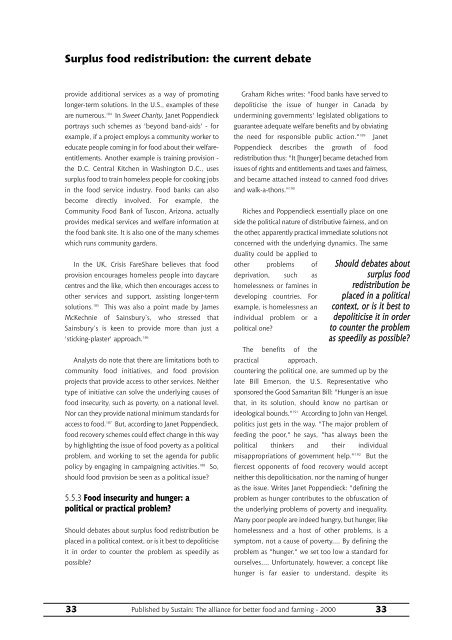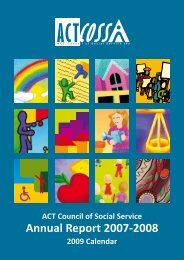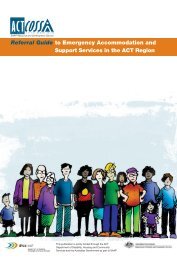Too much and too little? Debates on surplus food redistribution
Too much and too little? Debates on surplus food redistribution
Too much and too little? Debates on surplus food redistribution
You also want an ePaper? Increase the reach of your titles
YUMPU automatically turns print PDFs into web optimized ePapers that Google loves.
Surplus <strong>food</strong> redistributi<strong>on</strong>: the current debate<br />
provide additi<strong>on</strong>al services as a way of promoting<br />
l<strong>on</strong>ger-term soluti<strong>on</strong>s. In the U.S., examples of these<br />
are numerous. 184 In Sweet Charity, Janet Poppendieck<br />
portrays such schemes as 'bey<strong>on</strong>d b<str<strong>on</strong>g>and</str<strong>on</strong>g>-aids' - for<br />
example, if a project employs a community worker to<br />
educate people coming in for <strong>food</strong> about their welfareentitlements.<br />
Another example is training provisi<strong>on</strong> -<br />
the D.C. Central Kitchen in Washingt<strong>on</strong> D.C., uses<br />
<strong>surplus</strong> <strong>food</strong> to train homeless people for cooking jobs<br />
in the <strong>food</strong> service industry. Food banks can also<br />
become directly involved. For example, the<br />
Community Food Bank of Tusc<strong>on</strong>, Ariz<strong>on</strong>a, actually<br />
provides medical services <str<strong>on</strong>g>and</str<strong>on</strong>g> welfare informati<strong>on</strong> at<br />
the <strong>food</strong> bank site. It is also <strong>on</strong>e of the many schemes<br />
which runs community gardens.<br />
In the UK, Crisis FareShare believes that <strong>food</strong><br />
provisi<strong>on</strong> encourages homeless people into daycare<br />
centres <str<strong>on</strong>g>and</str<strong>on</strong>g> the like, which then encourages access to<br />
other services <str<strong>on</strong>g>and</str<strong>on</strong>g> support, assisting l<strong>on</strong>ger-term<br />
soluti<strong>on</strong>s. 185 This was also a point made by James<br />
McKechnie of Sainsbury’s, who stressed that<br />
Sainsbury’s is keen to provide more than just a<br />
'sticking-plaster' approach. 186<br />
Analysts do note that there are limitati<strong>on</strong>s both to<br />
community <strong>food</strong> initiatives, <str<strong>on</strong>g>and</str<strong>on</strong>g> <strong>food</strong> provisi<strong>on</strong><br />
projects that provide access to other services. Neither<br />
type of initiative can solve the underlying causes of<br />
<strong>food</strong> insecurity, such as poverty, <strong>on</strong> a nati<strong>on</strong>al level.<br />
Nor can they provide nati<strong>on</strong>al minimum st<str<strong>on</strong>g>and</str<strong>on</strong>g>ards for<br />
access to <strong>food</strong>. 187 But, according to Janet Poppendieck,<br />
<strong>food</strong> recovery schemes could effect change in this way<br />
by highlighting the issue of <strong>food</strong> poverty as a political<br />
problem, <str<strong>on</strong>g>and</str<strong>on</strong>g> working to set the agenda for public<br />
policy by engaging in campaigning activities. 188 So,<br />
should <strong>food</strong> provisi<strong>on</strong> be seen as a political issue?<br />
5.5.3 Food insecurity <str<strong>on</strong>g>and</str<strong>on</strong>g> hunger: a<br />
political or practical problem?<br />
Should debates about <strong>surplus</strong> <strong>food</strong> redistributi<strong>on</strong> be<br />
placed in a political c<strong>on</strong>text, or is it best to depoliticise<br />
it in order to counter the problem as speedily as<br />
possible?<br />
33<br />
Graham Riches writes: "Food banks have served to<br />
depoliticise the issue of hunger in Canada by<br />
undermining governments' legislated obligati<strong>on</strong>s to<br />
guarantee adequate welfare benefits <str<strong>on</strong>g>and</str<strong>on</strong>g> by obviating<br />
the need for resp<strong>on</strong>sible public acti<strong>on</strong>." 189 Janet<br />
Poppendieck describes the growth of <strong>food</strong><br />
redistributi<strong>on</strong> thus: "It [hunger] became detached from<br />
issues of rights <str<strong>on</strong>g>and</str<strong>on</strong>g> entitlements <str<strong>on</strong>g>and</str<strong>on</strong>g> taxes <str<strong>on</strong>g>and</str<strong>on</strong>g> fairness,<br />
<str<strong>on</strong>g>and</str<strong>on</strong>g> became attached instead to canned <strong>food</strong> drives<br />
<str<strong>on</strong>g>and</str<strong>on</strong>g> walk-a-th<strong>on</strong>s." 190<br />
Riches <str<strong>on</strong>g>and</str<strong>on</strong>g> Poppendieck essentially place <strong>on</strong> <strong>on</strong>e<br />
side the political nature of distributive fairness, <str<strong>on</strong>g>and</str<strong>on</strong>g> <strong>on</strong><br />
the other, apparently practical immediate soluti<strong>on</strong>s not<br />
c<strong>on</strong>cerned with the underlying dynamics. The same<br />
duality could be applied to<br />
other problems of<br />
deprivati<strong>on</strong>, such as<br />
homelessness or famines in<br />
developing countries. For<br />
example, is homelessness an<br />
individual problem or a<br />
political <strong>on</strong>e?<br />
SShhoouulldd ddeebbaatteess aabboouutt<br />
ssuurrpplluuss ffoooodd<br />
rreeddiissttrriibbuuttiio<strong>on</strong>n bbee<br />
ppllaacceedd iinn aa ppoolliittiiccaall<br />
cco<strong>on</strong>ntteexxtt,, oorr iiss iitt bbeesstt t<str<strong>on</strong>g>too</str<strong>on</strong>g><br />
ddeeppoolliittiicciissee iitt iinn oorrddeerr<br />
t<str<strong>on</strong>g>too</str<strong>on</strong>g> ccoouunntteerr tthhee pprroobblleemm<br />
aass ssppeeeeddiillyy aass ppoossssiibbllee??<br />
The benefits of the<br />
practical approach,<br />
countering the political <strong>on</strong>e, are summed up by the<br />
late Bill Emers<strong>on</strong>, the U.S. Representative who<br />
sp<strong>on</strong>sored the Good Samaritan Bill: "Hunger is an issue<br />
that, in its soluti<strong>on</strong>, should know no partisan or<br />
ideological bounds." 191 According to John van Hengel,<br />
politics just gets in the way. "The major problem of<br />
feeding the poor," he says, "has always been the<br />
political thinkers <str<strong>on</strong>g>and</str<strong>on</strong>g> their individual<br />
misappropriati<strong>on</strong>s of government help." 192 But the<br />
fiercest opp<strong>on</strong>ents of <strong>food</strong> recovery would accept<br />
neither this depoliticisati<strong>on</strong>, nor the naming of hunger<br />
as the issue. Writes Janet Poppendieck: "defining the<br />
problem as hunger c<strong>on</strong>tributes to the obfuscati<strong>on</strong> of<br />
the underlying problems of poverty <str<strong>on</strong>g>and</str<strong>on</strong>g> inequality.<br />
Many poor people are indeed hungry, but hunger, like<br />
homelessness <str<strong>on</strong>g>and</str<strong>on</strong>g> a host of other problems, is a<br />
symptom, not a cause of poverty.... By defining the<br />
problem as "hunger," we set <str<strong>on</strong>g>too</str<strong>on</strong>g> low a st<str<strong>on</strong>g>and</str<strong>on</strong>g>ard for<br />
ourselves.... Unfortunately, however, a c<strong>on</strong>cept like<br />
hunger is far easier to underst<str<strong>on</strong>g>and</str<strong>on</strong>g>, despite its<br />
Published by Sustain: The alliance for better <strong>food</strong> <str<strong>on</strong>g>and</str<strong>on</strong>g> farming - 2000 33













